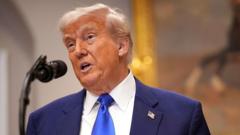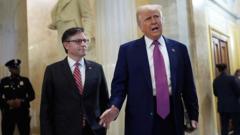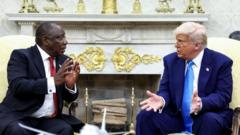In an unforeseen escalation of trade tensions, President Trump's recent tariff impositions have sent ripples through global markets, prompting significant reactions from China, Europe, and other nations.
**Tariff Turmoil: Global Markets React to Trump's Bold Trade Moves**

**Tariff Turmoil: Global Markets React to Trump's Bold Trade Moves**
Countries and businesses brace for impact as U.S. tariffs spark international backlash and economic uncertainty.
April 3, 2025, 6:30 a.m. ET
In the wake of President Trump's latest surprise tariffs, global markets have faced severe downturns as nations scramble to respond. The U.S. has initiated unprecedented tariffs of 34 percent on Chinese goods, 20 percent on European imports, and 24 percent on Japanese products—a move many experts deem catastrophic for the world economy.
Markets in Asia and Europe have quickly reacted to the news, with futures in the U.S. tumbling and significant losses reported in major Asian indexes. The Chinese government has condemned the tariffs as "unilateral bullying," threatening countermeasures to protect its interests. Meanwhile, in Brussels, European Commission President Ursula von der Leyen declared the EU's commitment to a robust collective response against what she characterized as an aggressive stance from Washington.
Japan's response has been tempered, with Prime Minister Shigeru Ishiba expressing disappointment but avoiding immediate retaliatory language. Instead, Japan remains focused on reinforcing its investments in the U.S. but is under pressure to counter the tariffs, which some analysts argue could both escalate tensions and destabilize trade relations.
The economic implications extend far beyond bilateral relations; U.S. consumers are poised to feel the financial strain as prices rise due to these tariffs, which have significantly inflated import costs across various sectors. Critics, including economists and business leaders, argue that Trump could have engaged in reforms to improve trade systems rather than opting for severe tariffs.
Germany's economy faces challenges as finance officials highlight significant risks from the automotive tariffs, cautioning that these measures could undermine expected growth. As the situation unfolds, automakers like Volkswagen and BMW are reportedly bracing for losses as they navigate the complexities of international supply chains complicated by these sudden price hikes.
Furthermore, countries like Vietnam and India are among those who will see substantial tariff increases, positioning them in difficult economic scenarios as they deal with fresh pricing pressures on exports critical to their economies. Vietnam, in particular, faces a staggering 46 percent tariff on its products, raising concerns about the long-term implications for its manufacturing base—previously buoyed by a shift of production away from China.
In summary, this series of tariffs not only threatens the stability of global trade relations but also poses a direct challenge to the economic recovery efforts of affected countries. As more nations consider their responses, the turmoil in international markets may only escalate, leading to deeper economic repercussions.
Businesses globally reflect a mixture of confusion and concern, looking for clarity as they navigate this evolving landscape of tariffs and trade policies.
In the wake of President Trump's latest surprise tariffs, global markets have faced severe downturns as nations scramble to respond. The U.S. has initiated unprecedented tariffs of 34 percent on Chinese goods, 20 percent on European imports, and 24 percent on Japanese products—a move many experts deem catastrophic for the world economy.
Markets in Asia and Europe have quickly reacted to the news, with futures in the U.S. tumbling and significant losses reported in major Asian indexes. The Chinese government has condemned the tariffs as "unilateral bullying," threatening countermeasures to protect its interests. Meanwhile, in Brussels, European Commission President Ursula von der Leyen declared the EU's commitment to a robust collective response against what she characterized as an aggressive stance from Washington.
Japan's response has been tempered, with Prime Minister Shigeru Ishiba expressing disappointment but avoiding immediate retaliatory language. Instead, Japan remains focused on reinforcing its investments in the U.S. but is under pressure to counter the tariffs, which some analysts argue could both escalate tensions and destabilize trade relations.
The economic implications extend far beyond bilateral relations; U.S. consumers are poised to feel the financial strain as prices rise due to these tariffs, which have significantly inflated import costs across various sectors. Critics, including economists and business leaders, argue that Trump could have engaged in reforms to improve trade systems rather than opting for severe tariffs.
Germany's economy faces challenges as finance officials highlight significant risks from the automotive tariffs, cautioning that these measures could undermine expected growth. As the situation unfolds, automakers like Volkswagen and BMW are reportedly bracing for losses as they navigate the complexities of international supply chains complicated by these sudden price hikes.
Furthermore, countries like Vietnam and India are among those who will see substantial tariff increases, positioning them in difficult economic scenarios as they deal with fresh pricing pressures on exports critical to their economies. Vietnam, in particular, faces a staggering 46 percent tariff on its products, raising concerns about the long-term implications for its manufacturing base—previously buoyed by a shift of production away from China.
In summary, this series of tariffs not only threatens the stability of global trade relations but also poses a direct challenge to the economic recovery efforts of affected countries. As more nations consider their responses, the turmoil in international markets may only escalate, leading to deeper economic repercussions.
Businesses globally reflect a mixture of confusion and concern, looking for clarity as they navigate this evolving landscape of tariffs and trade policies.





















